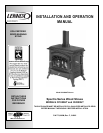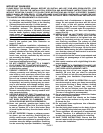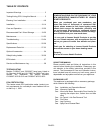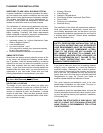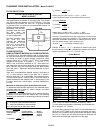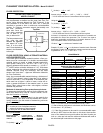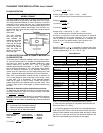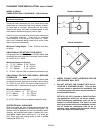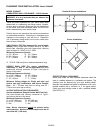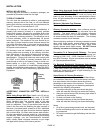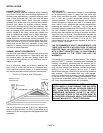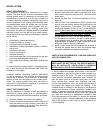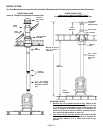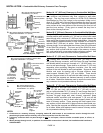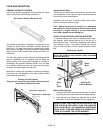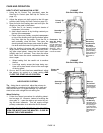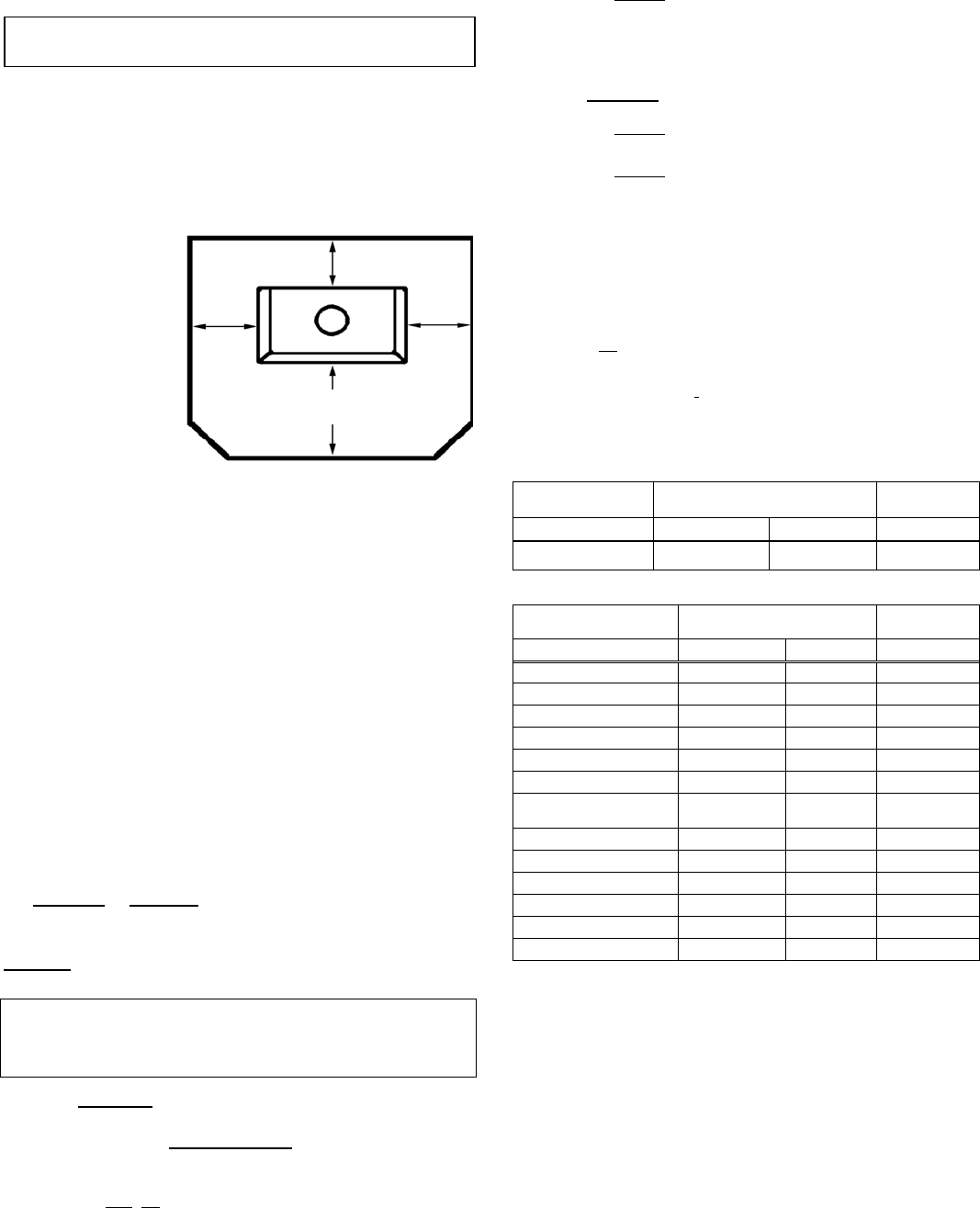
PLANNING YOUR INSTALLATION– Model CI2000HT
PAGE 7
Top View
FOR INSTALLATIONS IN THE USA & CANADA
MODEL CI2000HT
FLOOR PROTECTION
The floor protector must meet or exceed the minimum ther-
mal requirements as defined on this page (see Floor Protec-
tion Using Alternate Material As Floor Protector). If the floor
protection is to be stone, tile, brick, etc., it must be mortared
or grouted to form a continuous noncombustible surface. If a
chimney connector extends horizontally over the floor, pro-
tection must also cover the floor under the connector and at
least 2" (51 mm) to
either side.
The floor protector
must fully cover the
area beneath the
appliance and extend
18” to the front, 5”-
USA and 8”-Canada
to the sides, and 0”-
USA and 8”-Canada
from the back as
shown in the illustra-
tion to the right.
FLOOR PROTECTION USING ALTERNATE MATERIAL AS
FLOOR PROTECTOR
The hearth pad or alternate material used as a floor protec-
tor must be constructed of a durable noncombustible mate-
rial having an equal or better thermal conductivity value
(lower k value) of k = .84 BTU / IN FT
2
HR °F or a thermal
resistance that equals or exceeds r = 1.19 HR °F FT
2
IN/BTU
with a minimum thickness of 1/2”. With these values, deter-
mine the minimum thickness of the alternate material re-
quired using the formula(s) and the table shown here (see
chart – Approved Alternative Materials for Floor Protection).
Note: Any noncombustible material having a thickness of
1/2” (13 mm) whose k value is less than .84 or whose r value
is more than 1.19 is acceptable. If the alternate material
used has a higher k value or lower r value will require a
greater thickness of the material used. In some cases, if the
k value is less or the r value higher, a thinner material may
be used.
Methods of determining floor protection equivalents:
To determine the thickness required for the alternate mate-
rial when either the k value or r value is known, use either
the k formula
or r formula:
Example: Durock Cement Board is to be used for the floor
protection. How thick must this material be? The following
formulas
give the means of determining minimum thickness
required.
T
M
= minimum thickness required for alternate material
k
M
= k value per inch of alternate material
T
L
= minimum thickness of listed material
r
M
= r value per inch of alternate material
Using the k formula
:
Desired thickness k value of desire Minimum
of the alternate = material (per inch)
x thickness
material k value of listed of listed
material (per inch) material
T
M
(inches) = k
M
x T
L
.84
T
M
(inches) = 1.92 x 1/2”
.84
Answer using k: 2.286 x 0.50” = 1.143 = ~ 1 9/64”
~1 9/64” thickness Durock Cement Board will be required.
Using the r formula:
T
M
(inches) = 1.19 x T
L
r
M
T
M
(inches) = 1.19 x .5”
.52
Answer using r: 2.288 x 0.50” = 1.143 = ~ 1 9/64”
~1 9/64” thickness Durock Cement Board will be required.
At times it is important to know what combination of materials
are acceptable for use as floor protection. The “R values” are
used to determine acceptable combinations of materials be-
cause “R values” are additive where r and k values are not.
“R value” = 1
= r x thickness of material used
k
Example: “R value” = 1/k = r x thickness of material used. Given
that the required “R value” for a suitable floor protector used must be
equal to or greater than:“R” = r x T
L
= 1.19 x .5” = .60.
Listed Material
Listed Material Thermal Values Listed Min.
Thickness
k (per inch) r (per inch) T
L
Listed Material → .84 1.19 1/2”
Approved Alternate Materials for Floor Protection (**)
Alternative
M
ate
ri
a
l
s
↓
Thermal Values * Minimum
Thickness
k (per inch) r (per inch) T
M
Kaowool M Board .47 2.13 * 1/2”
Micore 160 .35 2.86 * 1/2”
Micore 300 .46 2.18 * 1/2”
Durock Cement Board 1.92 .52 1 3/16”
Hardibacker 1.95 .51 1 3/16”
Hardibacker 500 2.30 .44 1 3/8”
Cultered Stone
Hearthstone
2.82 .35 1 11/16”
Wonderboard 3.23 0.31 1 15/16”
Face brick 9.00 0.11 5 3/8”
Common brick 5.00 0.20 3”
Cement mortar 5.00 0.20 3”
Ceramic tile 12.5 .08 7 ½”
Marble ~20.0 ~.05 11 15/16”
Note: To convert inches to millimeters divide by .03937.
(*) After minimum thickness is calculated, the thickness can
be no less than 1/2” (13mm).
(**) If the floor protector to be used is a noncombustible ma-
terial and is NOT listed on this chart on this chart, the manu-
facturer of the material must provide either the listed k-value
per inch or r-value per inch and the minimum thickness will
need to be calculated per instructions on this page.
0" / 0 mm USA
8" / 203mm Canada
Canad
a
8"/203mm
USA
5" / 127 mm
USA & Canada
18" (457 mm)
Canad
a
8"/203mm
USA
5" / 127 mm



